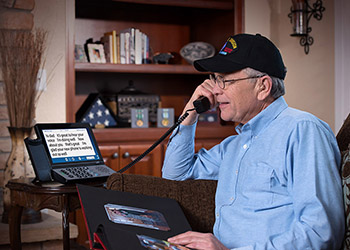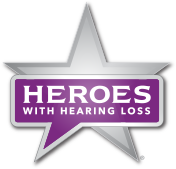How Live Conversations (Vs. Texting) Can Make You Healthier!
Imagine that you’ve just had something wonderful happen. Maybe you just got a big promotion at your job, or your sister just had a baby. Perhaps you’re an avid golfer and just got your very first hole-in-one! Whatever the news, your adrenaline is spiking, and the dopamine released from your brain has you on a momentary rush. You can’t wait to tell your best friend about what’s happened. Now imagine yourself pulling out your phone and texting the good news.
Now you wait for a response. Maybe those ubiquitous three little dots appear, maybe they don’t. Maybe you get a text back within a few seconds or minutes, maybe you don’t. Meanwhile, your adrenaline subsides and the momentary rush passes. Even if you get a response via text, it’s not going to feel the same.

Now let’s relive that same moment again, but instead of texting you call your best friend and they answer. Although just a hypothetical scenario, you can imagine the increased sense of joy in your body by having a real chat. The response is immediate and sharing the positive experience through an actual conversation is much more gratifying. A feeling that both parties participating in the conversation can now enjoy.
Guess what? Science tells us that being able to have that live conversation directly instead of texting also genuinely makes you healthier. In a 2021 study from the American Psychological Association, researchers found that study participants felt more connected with their conversation partners when they communicated over voice-based media [such as smartphones, tablets, etc.] than when they used text.1 This is important because of the direct link between social connection and well-being. A lack of social connection, or being socially isolated, can have a significant negative impact on health. In fact, according to a recent advisory from the U.S. Surgeon General, the societal impacts of social isolation and loneliness are a critical public health concern that can be as dangerous as smoking up to 15 cigarettes a day.2
It is also vital to understand the even more profound impact social isolation can have on those who experience hearing loss. According to Dr. Aysha Motala, a psychologist and researcher in sensory systems from the University of Stirling, “Understanding the relationship between hearing loss and social isolation is important because… it is associated with cognitive decline and other health-related issues such as poor nutrition, smoking, problem alcohol use, depression, and heart disease.”3

But, despite some misconceptions, having hearing loss doesn’t have to preclude person-to-person conversations that are vital to one’s health. Just because someone has difficulty hearing on the phone doesn’t mean they need to automatically default to a text conversation. Technologies such as Captioned Telephone allow for conversations in which participants can listen and read captions of what’s being said over the phone, providing them the ability to have those healthier voice-based conversations instead of texting. In that same American Psychological Association study, researchers also found that using commercial media methods that contain the human voice fosters a stronger sense of social connection than media lacking voice (i.e. texting) – even if that media includes additional visual cues.4
This news is of particular interest to veterans who, according to a Syracuse University study, often already struggle with social connection and may not feel as though they belong in society after separating from their military service.5 In addition, veterans are inherently at high risk for hearing issues, with tinnitus and hearing loss continuing to be two of the top service-connected disability claims with the Veterans Administration.6 This combination of factors puts veterans at an even greater risk of social isolation and its associated health risks than their civilian counterparts. In short, encouraging our nation’s heroes to communicate with friends and family regularly – through live conversations rather than texting – can have a profound positive impact on their health and well-being.
So, the next time you get that piece of wonderful news, pick up the phone to share with friends or family – but consider a live conversation rather than a text. Not only will it feel better and provide a surge of instant gratification, it will be a step toward a healthier you.
For more information on technologies such as Captioned Telephone, visit the Heroes With Hearing Loss solutions page. For more about the benefits of healthy conversations, download the white paper, “Why Conversation Matters For Older Adults And Veterans.”
1 Kumar, A., & Epley, N. (2021). “It’s Surprisingly Nice to Hear You: Misunderstanding the Impact of Communication Media Can Lead to Suboptimal Choices of How to Connect With Others,” Journal of Experimental Psychology: General, 150(3), 595–607, 2021 https://doi.org/10.1037/xge0000962
2 U.S. Surgeon General Dr. Vivek Murthy, “Our Epidemic of Loneliness and Isolation,” U.S. Dept. of Health and Human Services, 2023 hhs.gov/about/news/2023/05/03/new-surgeon-general-advisory-raises-alarm-about-devastating-impact-epidemic-loneliness-isolation-united-states.html
3 Motala A, Johnsrude IS, Herrmann B. “A Longitudinal Framework to Describe the Relation Between Age-Related Hearing Loss and Social Isolation.” Trends in Hearing, 2024 https://doi.org/10.1177/23312165241236041
4 Kumar, A., & Epley, N. (2021). “It’s Surprisingly Nice to Hear You: Misunderstanding the Impact of Communication Media Can Lead to Suboptimal Choices of How to Connect With Others,” Journal of Experimental Psychology: General, 150(3), 595–607, 2021 https://doi.org/10.1037/xge0000962
5 Emily Graham, “Combating Social Isolation and Loneliness Among Veterans after Separation from Military Service,” Lerner Center for Public Health Promotion and Population Health, Dec., 2022 maxwell.syr.edu/research/lerner-center/population-health-research-brief-series/article/combating-social-isolation-and-loneliness-among-veterans-after-separation-from-military-service
6 VA Annual Benefits Report, 2023 www.benefits.va.gov/REPORTS/abr/docs/2023-abr.pdf
 Heroes With Hearing Loss
Heroes With Hearing Loss